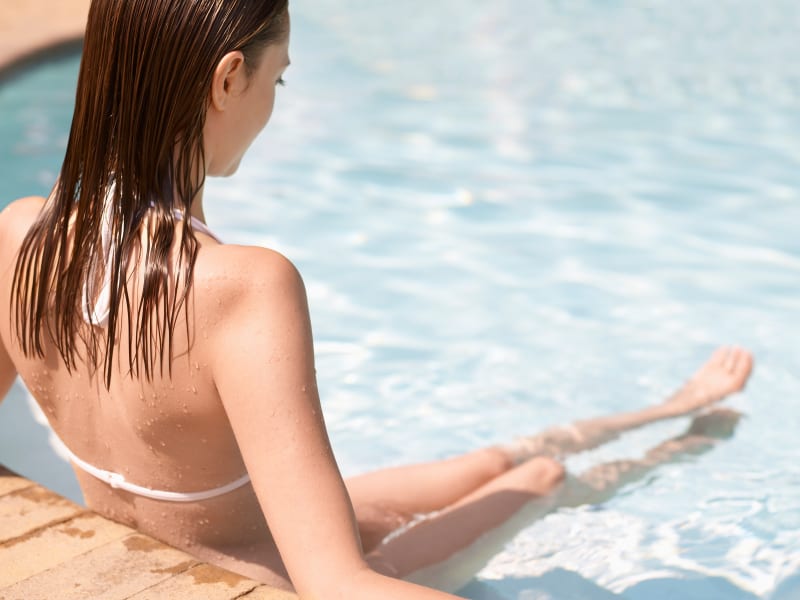While swimming can do wonders for the body, it isn’t always so great for your hair. If you fail to take haircare precautions, a summer of swimming can leave your hair a chlorine-damaged mess. Hair damage, however, is not a foregone conclusion — a little TLC can remedy chlorine’s negative impact.
Pre-Swimming Damage Prevention
Tending to your locks after swimming is significantly easier if you take some damage prevention precautions before hitting the pool. Prior to jumping into a chlorinated pool, wet your locks. Your hair soaks up water, according to HairLossExperts.com, so if you your locks soak up non-chlorinated water before you get into the pool, your hair does not become soaked with chlorine. Prior to heading out to the pool, visit the shower or use a garden hose to fully drench your locks.
Pre-Coat Your Locks
Wrap your locks in a protective layer before heading out to swim. Place a small amount of olive oil or your favorite conditioner on your hands, and run this oil-rich substance through your hair to coat the strands. This will protect your hair from the chlorine as you swim.
The Cover Up
If you’re a die-hard swimmer, one of the best ways to ensure that your hair doesn’t feel the effects of chlorinated or salt water is to cover your hair before diving in. Wearing a swimmer’s cap over your hair not only protects it from the chlorine — and sun when swimming outdoors — it also makes you appear more like a true athlete.
Post Swim Rinse
If you choose not to cover your hair, you should treat your locks as soon as you get out of the pool to minimize the chlorine damage. After exiting the pool, head straight to the shower and rinse your hair in warm water for three to five minutes. After rinsing away all of the chlorine, wash with your favorite shampoo, taking care to lather well and rinse carefully. If your hair still smells a bit chlorinated after this treatment, repeat the process.
Careful Combing
As your hair comes into contact with chlorine, it will likely become more brittle. To ensure that you don’t snap your tresses, avoid using a regular brush; instead brush through your locks carefully with a large-toothed comb. If you encounter a snag, don’t power through it, but work gently and carefully to undo the knotted section of hair.
Specialized Shampoos
If you only swim on occasion, you can likely continue using your current shampoo. But if you swim regularly, switching to a shampoo specifically designed for swimmers could prove advantageous. Speak to your stylist about the perfect shampoo for you. Many companies offer shampoos specifically designed to neutralize chlorine and minimize the impact that it has on your hair.





